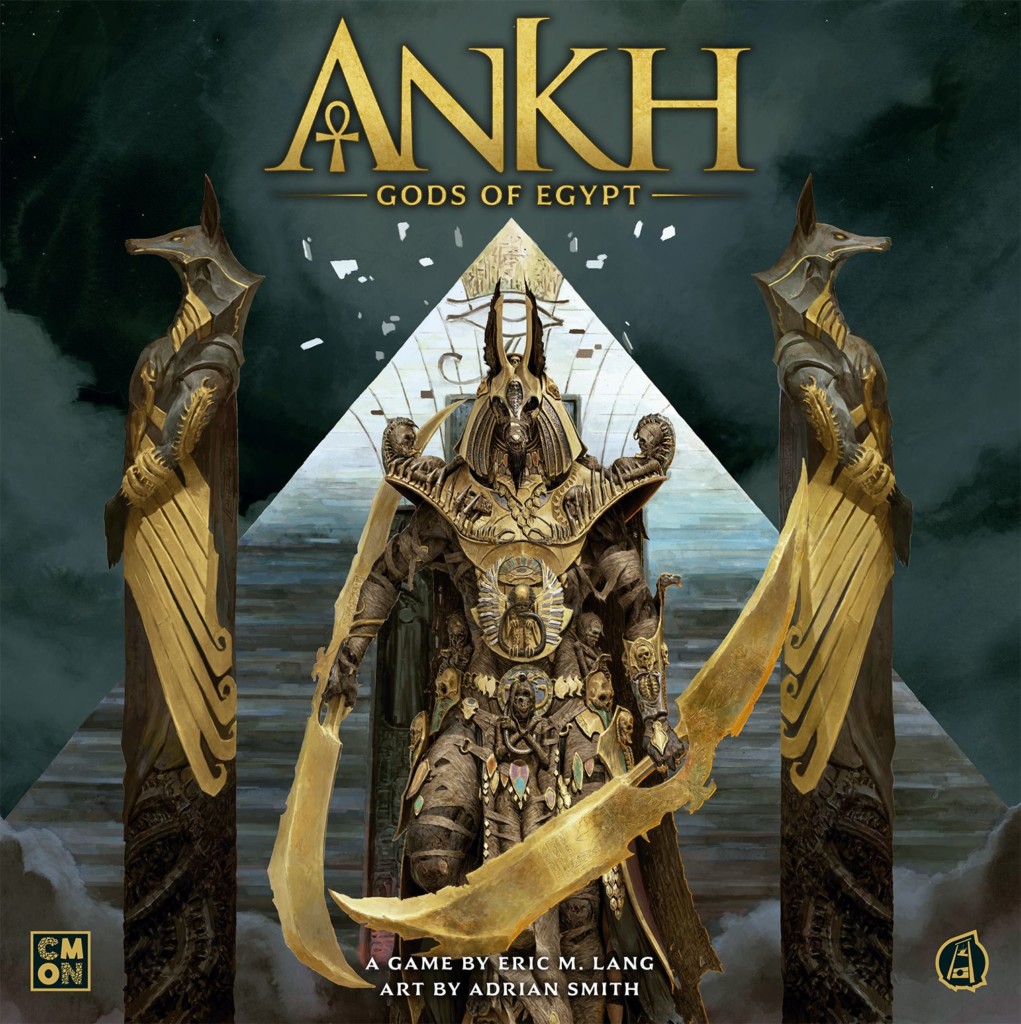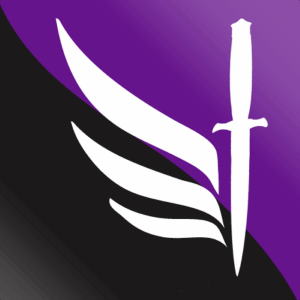Ankh: Gods of Egypt First Impressions
Ankh: Gods of Egypt is part of a famous miniatures-heavy trilogy.
How is it? and what do I think of THAT controversial mechanism?
Play as a god of ancient Egypt, competing to survive as society begins to forget the old ways, so that only you and your followers remain.
Ankh: Gods of Egypt Game Play
The game board is divided into regions each separated by the river Nile. During the setup of some scenarios and during the game, camel caravans will be used as dividers to break these regions down into smaller regions.
Next to this main board are the Central dashboard, Devotion track and Palace dashboard. These have cards and tokens all over them that we’ll go through as we look at the gameplay.
Players get a God figure, 6 Warriors, a God dashboard, a merged God dashboard and some tokens and cards. Players also get 3 priests of their colour and they are placed in the Chamber of Law of the palace board.
Next to all of these boards is a level 1, 2 and 3 random Guardian.
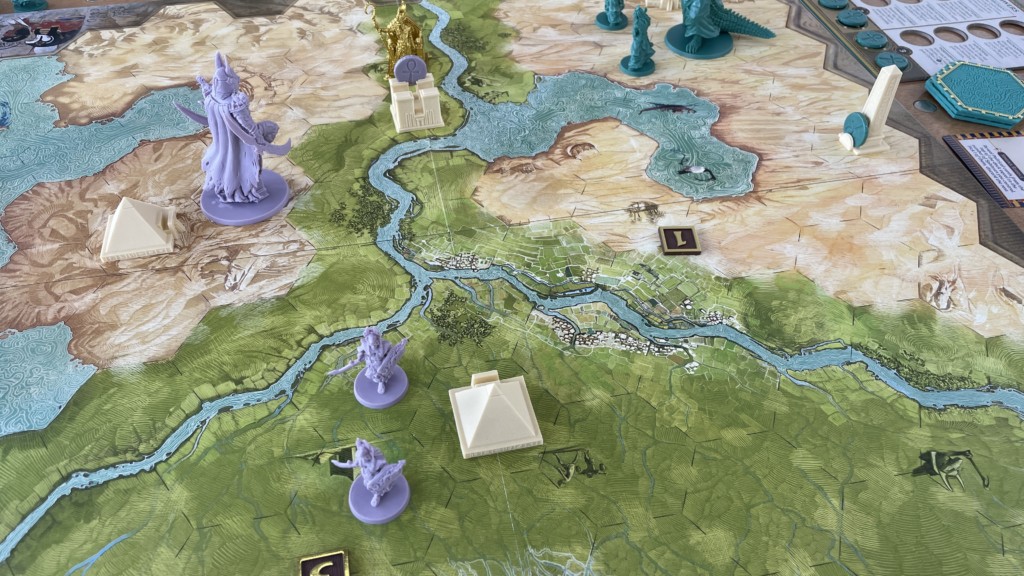
On a turn, a player will take 1 or 2 actions then resolve an event if one triggers on that turn. The 4 actions are Move, Summon, Gain Followers and Unlock Ankh Power.
To take an action, move the matching action token one space right and ‘resolve’ the action. After resolving, if on a white space at the end of a track, resolve an event. If they didn’t trigger an event, they take a 2nd action that MUST be lower down on the central Dashboard.
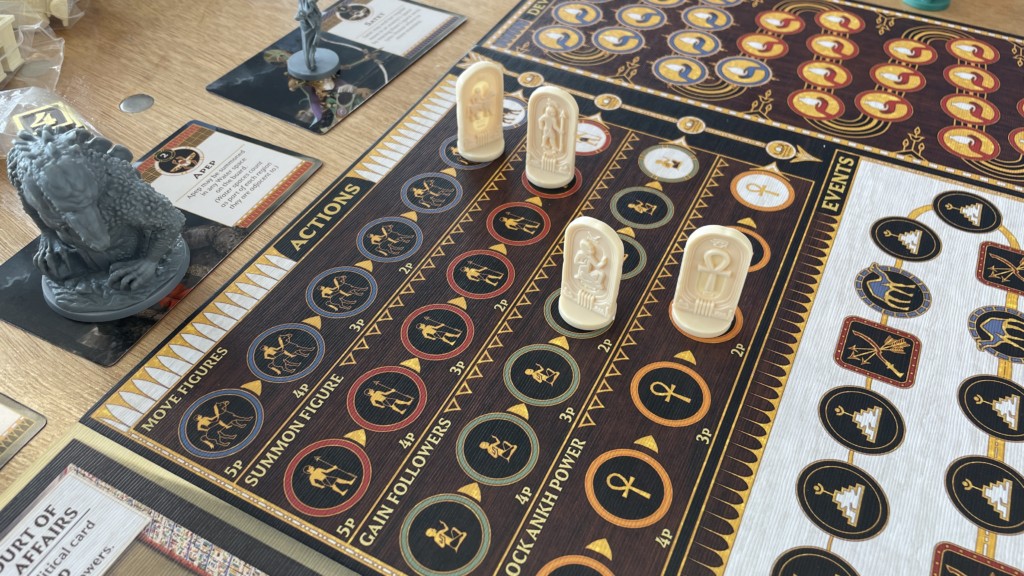
Let’s look at the actions.
Summon
Choose a warrior or guardian, place them on an empty land space next to a friendly figure. In addition, summon a Priest into any room in the Palace.
Move
Move each figure on the board 1, 2 or 3 spaces. Then also move each Priest into an adjacent room through doors in the Palace.
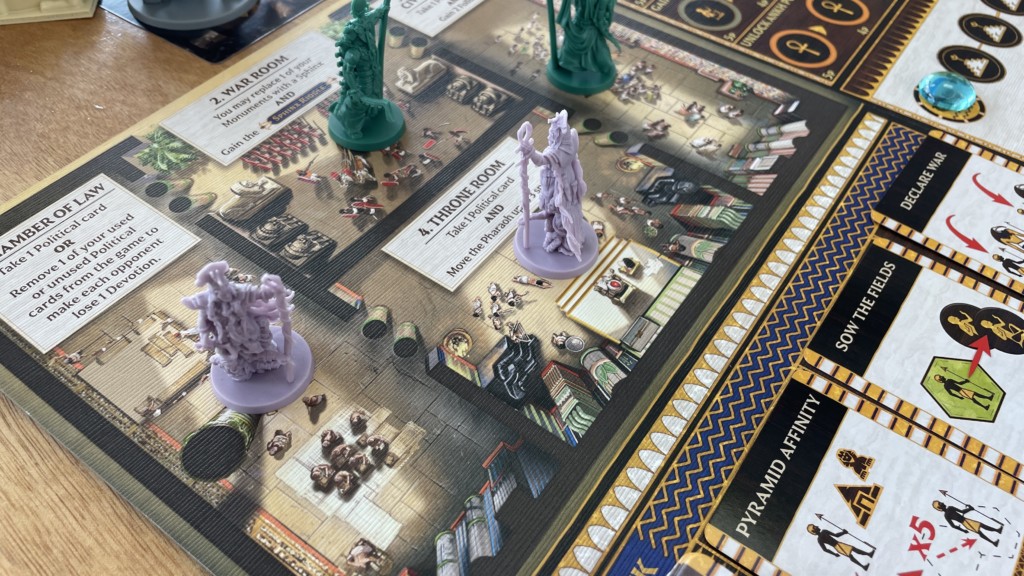
Gain Followers
Gain follower tokens from the supply equal to the number of owned monuments and neutral monuments adjacent to a friendly figure.
Unlock Ankh Power
The player board is divided into 3 levels and players can unlock at most 2 powers on each level. Players must sacrifice followers equal to the level of the power to unlock it.
Guardians can be unlocked by an Ankh power. If so, the player takes one at the relevant level. These are powerful monsters that are now on your side.
After moving the marker for the action but before or after resolving that action, a player may play a Political card. These have different effects on the game.
Events
There are a few events triggered as the game progresses.
Control Monument – These are either an Obelisk, Pyramid and or Temple controlled by the player. They can gain control of 1 neutral monument adjacent to a friendly figure. Then the Palace dashboard rooms are resolved in numerical order. The player with the most priests in each room returns them to the supply and resolves the room.
Chamber of Law: Gain a Political card, or discard one and each other player loses a Devotion
War Room: The player replaces one of their monuments with a Sphinx and resolves the Sphinx riddles the Pharaoh card. This is an ability that triggers depending on which Pharoh you’re playing with.
Court of Civil Affairs: Pick 1 face-up political card and gain 2 followers.
Throne Room: Pick 1 face-up political card, move the Pharaoh 3 spaces
Camel Caravan – Add up to 6 caravans onto lines between spaces to create a new region.
Conflict
The player that triggers this takes the battle tiebreaker token and keeps it face up. A conflict is triggered in each region in order.
If the region only contains 1 Players figures, they Dominate. They gain 1 Devotion for each monument of each type they control more than opponents in that region, +1.
Two or more players figures, they Battle.
1 – Each player chooses a battle card from their hand, reveal it simultaneously.
2 – Resolve build monument battle cards starting with the player with the least devotion.
3 – Resolve all Plague of Locus battle cards if played where players bid followers to try and wipe out the enemy early.
4 – Players with the most monuments gain 1 Devotion for each monument of each type they control more than opponents. Devotion is awarded in reverse devotion order.
5 – Each player works out their strength in the region, Each figure has a basic strength of 1 plus bonuses from battle cards, Guardians, Ankh abilities etc
The highest strength wins and kills all enemies in that region except Gods, they can not be killed. A player with the battle tiebreaker token can flip it face down to win a tie once per conflict round. If there is a tie and no one has the tiebreaker token, everyone dies.
Merging Gods
After the 3rd conflict, the 2 gods on the bottom of the devotion track merge and win/lose together as a team. The second bottom is the higher merge god, the bottom is the lower merge god. Remove the lower merged gods monuments, non-guardian figures, cards and give the lower gods followers and guardians to higher god.
The lower God changes their Ankh powers to match the higher god and this new merged God has the abilities of both god boards. Both players control the warriors, guardians and followers of the higher god taking 1 action each without the restrictions of selection as mentioned before.
After the 4th conflict, any god in the red section of the devotion track is eliminated, but at this point, the game is nearly over.
The game ends if a player gets to the top of the devotion track, they win immediately. If a player is the only one left after the 4th conflict, they win automatically. But if there are no players left after the 4th conflict, Egypt is now atheist and everyone loses.
Otherwise, the player with the most devotion after the final event is the winner.
Theme
Much like the earlier games in the series, Blood Rage with Norse and Rising Sun with Japanese, all the familiar things are there. Ankh: Gods of Egypt has all the gods, pyramids etc Things you think of when you think ancient Egypt.
I don’t know enough to know if gods merge or fight but religion being a religion, I’m sure there was in-fighting.
Setup & Rulebook
Setup is fiddley with bits all over the place as is standard with these games.
The rulebook is decent as you expect from CMON. The issue comes from each expansion having its own book, sometimes it’s hard to find a rule you need quickly.
Components & Artwork
As always excellent. The minis in Ankh: Gods of Egypt are great and all the Kickstarter extras make the game look really good on the table.
The art is standard for CMON games too. You know what you’re getting.
Ease of Teaching & Accessibility
Everything is open information and most things are on the boards or included crib sheets. There are a few rules you need to teach and remember but overall it’s fine.
It’s all open information which makes things easier.
Ankh: Gods of Egypt Summary
So I mentioned the other games in the series and this is similar to them. It’s closer to Rising Sun with Blood Rage now feeling like a game outside this series rather than the first one in it.
This game is decent. The action selection is really good as is the flow of events and all the other bits and bobs that make up the gameplay.
What about the divisive merge mechanism? I like the idea of it. I think if you don’t like it, play well and don’t be in the bottom 2 players when the time comes. But, I never experienced it myself.
I played it two-player and thought it was OK. Then I took it to two more game days and never really pushed to get it played so I decided to sell it. In fact, it caused me to also reconsider and sell Blood Rage and Rising Sun, the latter I only played twice. Funnily enough, as I’m writing this payment came through from my Ankh: Gods of Eqypt sale.
So I must dislike this game right? No. If it fits in one box and had a value of £50-100 I could keep it on the shelf and pull it out occasionally. But a 3 box £300 game is too much both spatially and financially to sit gathering dust.
I may regret missing the 7 boxes of Kickstarter exclusives and upgraded components from these games, But currently, I don’t play them so they have no value to me doing nothing.
Jesta ThaRogue
